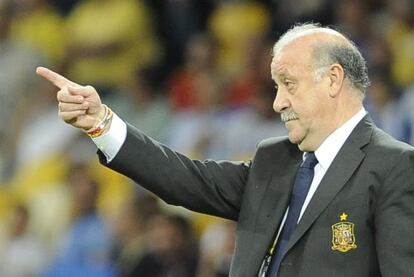Del Bosque’s mark is Spain’s gain
Already inscribed in Spanish nobility, national coach enters soccer hall of fame

Among all the records achieved by Spain during its 4-0 demolition of Italy was one that set the national team coach, Vicente del Bosque, apart from his peers and in a category of all of his own. Fernando Torres, whose place in the squad was in doubt just weeks before the tournament, is now the only player in history to have scored in two European Championship finals and his goal on Sunday night, Spain’s third, ensured that Del Bosque would become the first manager in the sport’s annals to have won both the continental title, the World Cup and the Champions League.
After Spain’s success in South Africa, King Juan Carlos bestowed the title of marquis upon the unassuming Salamancan, but there is little doubt that Del Bosque’s mustache would have twitched with rather more satisfaction at his investment into the sport’s nobility. Under the late Helmut Schön, West Germany had been within touching distance of the triple-crown feat of successive European triumphs either side of a World Cup win. Schön led his side to glory at Euro 1972 in Belgium and the 1974 World Cup on home soil. At Euro 1976, in Yugoslavia, a Czech player called Antonin Panenka wrote his name in history by scoring the decisive penalty in the shootout to claim the title. His dinked effort is eponymous and alive and kicking; Sergio Ramos mimicked it during the semifinal shoot-out against Portugal in Donetsk.
Del Bosque’s journey to the pinnacle of his profession has in many ways been as unexpected as Panenka’s chip. A Real Madrid player during his entire career, with a few loan spells early on, Del Bosque started out coaching the club’s reserves in 1987, managing the first team for a couple of months in 1994 and for one game in 1996 when the venerable institution needed a night watchman. He would be given the job permanently after the departure of John Toshack and led Real through the most successful spell in its history, which reaped two Liga titles and two Champions Leagues. Del Bosque’s 2002 triumph remains Real’s most recent and the stability he brought to the club during the first galáctico era has only been rediscovered since the arrival of José Mourinho in 2010.
Nevertheless, Del Bosque was unceremoniously discarded immediately after delivering the Liga title in 2003, the star-struck Real management considering that the coach’s style had become outmoded. A short, unspectacular stint at Besiktas in 2004-05 was Del Bosque’s only other employment until he took the reins of the national side after the Euro 2008 breakthrough under Luis Aragonés. It was no secret that leading players including Iker Casillas lobbied for Aragonés to stay on after delivering that title and the first questions Del Bosque faced were not so much tactical — he stated the winning passing style would remain — as focused on whether or not he would reinstate Raúl and Guti, his old Real charges, after Aragonés had dispensed with their services in favor of the bajitos, led by a front line of David Villa and Torres.
He is so modest that even last night he carried on as if it was nothing to do with him”
Few now would claim memory of even the briefest resistance to Del Bosque’s appointment. He has proved to be tactically flexible, embracing the theory of the false nine, a perfect ruse given his resources and one that discovered its loquacity in the final against Italy after dissenting voices had questioned its effectiveness in earlier rounds. As a stop-gap solution to the unavailability of Villa, it proved that this crop of players can adapt to any demand. In 2008 Spain scored 12 and conceded four; at this tournament the same number went in at the opposition end, with only Italy breaching the back line once.
It was little surprise that the Spanish Football Federation chose to renew Del Bosque’s contract mid-tournament. It is an extremely rare occurrence and designed to show absolute faith in the coach regardless of Spain’s final showing, while also warding off any knee-jerk attempts to lure Del Bosque back into club management.
The bookmakers’ odds on a second consecutive World Cup will be as short as Spain’s midfield in Brazil. The team has an average age of just under 27 and Xavi, a comparative warhorse at 32, has stated he will play on until 2014, by which time Casillas, then 33, will be in a goalkeepers’ prime. “He is a role model,” said Uefa technical chief Andy Roxburgh of Del Bosque. “He is so modest that even last night he carried on as if it was nothing to do with him.”
Tu suscripción se está usando en otro dispositivo
¿Quieres añadir otro usuario a tu suscripción?
Si continúas leyendo en este dispositivo, no se podrá leer en el otro.
FlechaTu suscripción se está usando en otro dispositivo y solo puedes acceder a EL PAÍS desde un dispositivo a la vez.
Si quieres compartir tu cuenta, cambia tu suscripción a la modalidad Premium, así podrás añadir otro usuario. Cada uno accederá con su propia cuenta de email, lo que os permitirá personalizar vuestra experiencia en EL PAÍS.
¿Tienes una suscripción de empresa? Accede aquí para contratar más cuentas.
En el caso de no saber quién está usando tu cuenta, te recomendamos cambiar tu contraseña aquí.
Si decides continuar compartiendo tu cuenta, este mensaje se mostrará en tu dispositivo y en el de la otra persona que está usando tu cuenta de forma indefinida, afectando a tu experiencia de lectura. Puedes consultar aquí los términos y condiciones de la suscripción digital.








































